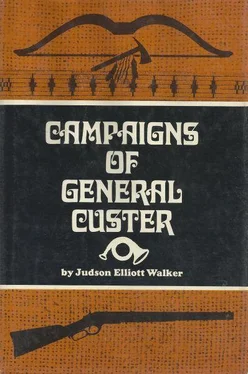Walker Array - Campaigns of General Custer in the North-west, and the final surrender of Sitting Bull
Здесь есть возможность читать онлайн «Walker Array - Campaigns of General Custer in the North-west, and the final surrender of Sitting Bull» весь текст электронной книги совершенно бесплатно (целиком полную версию без сокращений). В некоторых случаях можно слушать аудио, скачать через торрент в формате fb2 и присутствует краткое содержание. Жанр: Историческая проза, Исторические приключения, Приключения про индейцев, на английском языке. Описание произведения, (предисловие) а так же отзывы посетителей доступны на портале библиотеки ЛибКат.
- Название:Campaigns of General Custer in the North-west, and the final surrender of Sitting Bull
- Автор:
- Жанр:
- Год:неизвестен
- ISBN:нет данных
- Рейтинг книги:5 / 5. Голосов: 1
-
Избранное:Добавить в избранное
- Отзывы:
-
Ваша оценка:
- 100
- 1
- 2
- 3
- 4
- 5
Campaigns of General Custer in the North-west, and the final surrender of Sitting Bull: краткое содержание, описание и аннотация
Предлагаем к чтению аннотацию, описание, краткое содержание или предисловие (зависит от того, что написал сам автор книги «Campaigns of General Custer in the North-west, and the final surrender of Sitting Bull»). Если вы не нашли необходимую информацию о книге — напишите в комментариях, мы постараемся отыскать её.
Campaigns of General Custer in the North-west, and the final surrender of Sitting Bull — читать онлайн бесплатно полную книгу (весь текст) целиком
Ниже представлен текст книги, разбитый по страницам. Система сохранения места последней прочитанной страницы, позволяет с удобством читать онлайн бесплатно книгу «Campaigns of General Custer in the North-west, and the final surrender of Sitting Bull», без необходимости каждый раз заново искать на чём Вы остановились. Поставьте закладку, и сможете в любой момент перейти на страницу, на которой закончили чтение.
Интервал:
Закладка:
The Belknap impeachment trial, although the criminal escaped deserved punishment by a precipitate resignation of his office, has no doubt had a great moral effect upon the different departments of the Government. Belknap now stands before the American people-not one of the leading officials of the country-not the honorable and dignified. Secretary of War he once appeared to be-but in the eyes of those who watched his career, he stands a disgraced man„
with " none so poor to do him reverence." He has lost not simply office and position, but character, reputation and the respect of the American people, who would have been glad to have held him in their highest esteem until this day, had he deported himself with honor.
Let his example serve to deter the future high officials of the land from deviating from the path of strict rectitude. The homely old motto, " Honesty is the best policy," is as well worthy the consideration of a politician and office-holder as of that of the average citizen.
CHAPTEE IV.
Custer Displaced from live Command of the Eastern Column, at
Fort Lincoln.
Custer was displaced from the command of the eastern column, then in process of organization, at Fort Lincoln, and forbidden, by order of the President, to accompany the troops on the march. General Terry was placed in command of the expedition, but afterward, in response to the earnest entreaties of Custer to be spared the humiliation of seeing the troops march without him, the President's order was so far modified as to permit him to go with the expedition, in command of the 7th Cavalry. Thus reorganized, the column left Fort Lincoln with 12 companies of the 7th Cavalry, under Lieutenant-Colonel Custer, 3 companies of the 6th and 17th Infantry, 4 Gatling guns, and a detachment of 45 Indian scouts, under the Arickiree chief, Bloody Knife. The wagon train consisted of 114 six-mule teams, 37 two-horse teams, 70 other vehicles, ambulances, etc., with 85 pack-mule and 179 civilian drivers -a total force of 2,700 armed men-seeking the Sioux, and divided into three columns of 1,300, 400, and 1,000 respectively. These three columns started from the circumference of a circle with a radius of three hundred miles, under orders to concentrate and join their converging lines somewhere in the region enclosed by the Big Horn and Powder Rivers-where the enemy was supposed to be in force-there to enclose and crush out the desperate remnants of savage outlaws, their number being variously estimated at from 1,000 to 3,000. Later events proved the fallacy of this belief ; that between 3,000 and 5,000 Indians were massed in the fatal valley of the Yellowstone, awaiting in savage ferocity the coming of the troops, all of whom they could easily have annihilated with their superior arms and steeds, had the remainder of them come within their lines.
Who that lived in Bismarck in the year 1876, during the time that the " Lincoln column " of the great expedition was being fitted out across the river, will forget that it was matter of public notoriety that the savage hordes were gathering their clans from north and from south, to dispute the passage of the soldiers ; that even while their godly agents were crying aloud, "All is well/' the Bed Cloud, Standing Hock and Spotted Tail agencies were being depopulated of their fighting material. Supply trains, with men, arms, ponies, provisions, ammunition and warriors, were rushing to that wild rendezvous on the Yellowstone, where the restless Sitting Bull awaited the tardy coming of the royal sacrifice. Each new accession to their ranks was hailed with acclamations of delight, and in the weird gyrations of the war-dance the blood-stained wretches recounted their gory deeds, and sought to stimulate each other to horrid acts of brutality and bloodshed. Who that heard them can forget those significant inquiries heard in the streets of Bismarck, by emissaries fresh from Sitting Bull's camp, during the sad days of Custer's humiliation under presidential displeasure, when the men waited in arms for the order to march, and their brave, outspoken commander chafed in bitterness of spirit under the undeserved disgrace of being ordered to stay behind. "What are the dog-soldiers waiting for?" "Are they tired before they start?" "What is the matter with Custer?" "Is the long-haired chief sick?" All these and more, coupled with direful threats and sickening messages of expectant revenge, from Bain-in-the-Face and his no less bloody followers, were repeated from mouth to mouth, and excited in many hearts sad feelings of foreboding relative to the fate of the gallant Custer, who in going forth to give battle to the merciless chieftain of the Sioux, left behind him, in the person of XL S. Grant, the chief executive of the land, a, foe no less relentless.
On June 21st Gibbon's column was sent from Terry's camp on the Yellowstone, at the mouth of Tongue River, to the mouth of the Big Horn River, where, after being ferried across by the supply steamer " Far West," that had followed by river from Fort Lincoln, it was directed to proceed to the forks of the Little and Big Horn, its future movements to be controlled by circumstances as they should arise, but with the hope expressed by General Terry that the Indians in the Little Big Horn region should be enclosed by Gibbon's column, in co-operation with the 7th Cavalry, under Ouster, who left Terry's camp on the Yellowstone and Tongue Rivers on the afternoon of June 22d, in pursuit of a large body of Indians, whose trail, proceeding up the Rosebud River, had been discovered a few days previously in a scouting expedition by Major Reno, of the 7th Cavalry. Lieutenant-Colonel Ouster was not hampered by positive orders, being simply advised to follow the Indian trail until its general direction was definitely ascertained. Then, if, as was expected, it should be found to turn toward the Little Big Horn, he was directed to proceed southward as far as the headwaters of the Tongue, and then to turn toward the Little Big Horn, guarding constantly against the possibility of the Indians escaping around his left flank to the south and rear, General Terry distinctly stating that " such was his confidence in the zeal, energy and ability of Lieutenant-Colonel Custer, that he would not impose upon him precise orders, which might hamper his action when nearly in contact with the enemy."
CHAPTER V.
March to the Battle-fidd.
Tl\us, with his future course of action left to his own discretionary judgment, Lieut.-Colonel Custer, with his regiment, left camp on the Yellowstone, June 22d, and proceeded up the Eosebud Eiver during the 23d and 24th, making sixty-one miles, the trail and Indian signs freshening with every mile, when they encamped and waited for information from the scouts, whose detachment had accompanied the regiment. It was ascertained, beyond doubt, that the Indian village was in the valley of the Little Big Horn, and, in order to reach it without discovering their approach to the Indians, a night march was decided on, the troops moving at 11 P. M., the line of march turning from the Eosebud to the right, up one of its branches. At 2 A M. of the morning of the 25th, it was* ascertained that the divide between the Eosebud and the Little Big Horn Eivers could not be crossed before daylight. The command then rested for three hours and made coffee, many of the brave fellows then partaking of their last meal on earth. The march was then resumed and the divide crossed, and about 8 A. M. the command was in the valley of one of the branches of the Little Big Horn. Indians being then plainly seen, and as it was thus evident that the troops could not take them by surprise, it was decided to attack them at once.
On the march, Custer had divided the regiment into three separate commands, assigning to Major M. A Eeno, Companies M, A and G, and to Captain Benteen, H, D and K, retaining himself the command of Companies C, E, F, I" and L ; Captain McDougal being assigned with Company B to the care of the pack train in the rear.
Читать дальшеИнтервал:
Закладка:
Похожие книги на «Campaigns of General Custer in the North-west, and the final surrender of Sitting Bull»
Представляем Вашему вниманию похожие книги на «Campaigns of General Custer in the North-west, and the final surrender of Sitting Bull» списком для выбора. Мы отобрали схожую по названию и смыслу литературу в надежде предоставить читателям больше вариантов отыскать новые, интересные, ещё непрочитанные произведения.
Обсуждение, отзывы о книге «Campaigns of General Custer in the North-west, and the final surrender of Sitting Bull» и просто собственные мнения читателей. Оставьте ваши комментарии, напишите, что Вы думаете о произведении, его смысле или главных героях. Укажите что конкретно понравилось, а что нет, и почему Вы так считаете.












